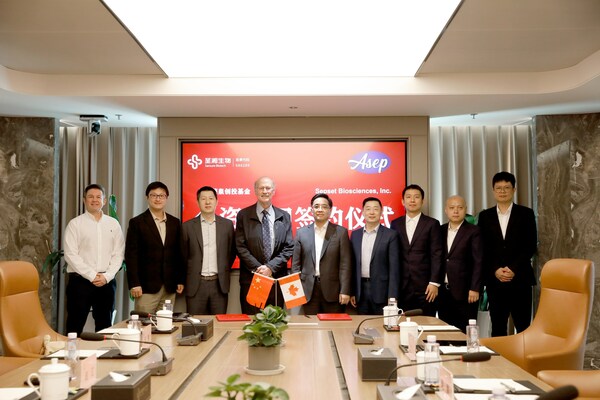



Original from: PR Newswire
Asep Medical Holdings Inc. ("Asep" or the "Company") (CSE: ASEP) (OTCQB: SEPSF) (FSE: JJ8) is very pleased to announce that, through its subsidiary Sepset Biosciences Inc. ("Sepset"), it has signed a definitive joint venture agreement (the "JV Agreement") with leading Chinese medical diagnostic company, Sansure Biotech Inc. ("Sansure"), through its subsidiary, Hunan Xiang Jiang Sansure Biotech Fund, L.P. (the "Sansure Fund"). Sansure Fund is an investment fund formed by Sansure, Changsha Sanway Spring Venture Capital CO., Ltd. ("Sanway Spring") and certain other investors. The JV Agreement was signed on October 27, 2023.
Under the JV Agreement, the registered capital of the joint venture entity, Hunan Sanway SepSMART Ltd. ("SepSMART"), which will be based in Changsha, China, will be RMB 50,000,000 (the "Total Registered Capital") with (a) the Sansure Fund subscribing for RMB 37,500,000.00 (~CAD$ 7 million) thereof, representing seventy-five percent (75%) of the Total Registered Capital and (b) Sepset deemed to be subscribing for RMB 12,500,000 (~CAD$ 2.4 million) thereof, representing twenty-five percent (25%) thereof through the contribution of certain patent rights to Sepset's first generation rapid sepsis test, SepsetER, pursuant to a technology license and collaboration agreement concurrently entered into on October 27, 2023 between Sepset and SepSMART (the "License Agreement" and together with the JV Agreement, the "Transaction"). Formal registration of SepSMART with the applicable regulatory body in China is a condition precedent of the JV Agreement. The License Agreement grants SepSMART the exclusive right to commercialize SepsetER in Mainland China, the Hong Kong Special Administrative Region, the Macao Special Administrative Region and the Taiwan area for a period of eight (8) years and requires SepSMART to pay periodic royalty payments to Sepset on a performance basis. The Transaction represents a significant milestone for Asep and supports its manufacturing and distribution strategy based on global partnerships with companies that offer existing market knowledge and sales channels.
According to the China Critical Care Clinical Trials Group, nearly 2 million people died in China from sepsis in 2015.1 The frequency of deaths in that country is unusually high (66.7 per 100,000 people). A 2021 meta-analysis by the Department of Emergency Medicine, Tianjin Medical University General Hospital and published by BioMed Central Ltd. (biomedcentral.com) concluded that "the frequency and mortality of sepsis and septic shock in China were much higher than North America and European countries."
"Sansure is one of the largest companies in China with both manufacturing and distribution expertise in PCR-based diagnostic assays, which is the technology we use in our SepsetER test," stated Dr. Robert E. W. Hancock, Founder, CEO and Board Chair of Asep and developer of the sepsis risk assessment technology, SepsetER. "This represents an endorsement of the potential of our assay and its importance to human medicine worldwide, as well as access to one of the largest markets in the world. We look forward to collaborating with the Sansure team as we bring this technology to market in China."
In connection with entry into the JV Agreement, Asep, Sepset, Sanway Spring and the Sansure Fund entered into a side letter (the "Side Letter") to provide certain additional representations, warranties, agreements and terms in relation to the joint venture. Pursuant to the Side Letter, Asep and Sansure entered into a performance warrant issuance agreement whereby Asep agreed to provide 3,000,000 performance warrants (the "Performance Warrants") to Sansure or its designated nominees, subject to the required approvals and compliance with applicable securities laws and stock exchange policies. Each Performance Warrant is exercisable into one common share of Asep at an exercise price of $1.00per common share until the first anniversary of the signing of the JV Agreement. The Performance Warrants and underlying common shares are subject to a hold period expiring four months and one day from the date of issuance.